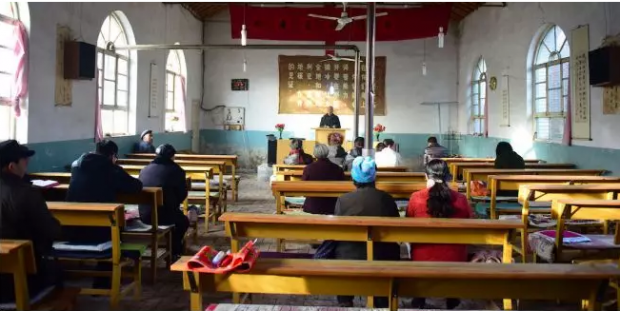With the rapid development of new urban construction, a large number of rural laborers move to cities. Urban churches and rural churches differ in the aspects of growth of believers, pastoral care and worshipping and this causes them to gradually begin to polarize.
Most of the urban churches attract young intellectuals, while the number of believers left behind in rural areas is dominated by middle-aged and old people, young and middle-aged women with lower levels of education, and children. Although they appear to be unremarkable, their number, if all added up, also takes a considerable amount of ministry effort.
According to the 2010 Blue Book of Religions, "the overall number of Christians in China is estimated at 23.05 million, while 80% per cent of them are located in rural areas."
Not long ago, I visited a rural church in the central region and found that although the small chapel was full, almost all those attending were middle-aged and old. Amongst all the white hair, it was difficult to find an all-black haired one. But it was also this group, who, listening to the preacher's sermon, had a moving desire and contentment on their faces--even though the pastor's sermon was so simple that they still listened with great relish.
In the course of the sermon, the believers concentrated on and followed the preacher's sermon and occasionally replied with an "Amen". When I saw this phenomenon, I couldn't help thinking: "Why is it that just a very simple sermon can satisfy these middle-aged and elderly believers?"
Pastor Y, who is often invited to preach in the countryside, says: In fact, the countryside is not pastoral at all. The main reason is the lack of preachers and pastors.
And some pastors who go from the city to the countryside to study are giving simple teachings, and it is even hard for them to get simple teachings. This is the reason why the author finds it difficult to understand the problem mentioned above.
Although the rural believers are mainly middle-age and old, they are many. Because there are too few pastors, believers' spiritual foundation is not strengthened. Their faith is unclear, and some people even show no change in their life after they come to faith. So there are numerous bad testimonies and the God's name is desecrated. It also leads directly to the rejection, hostility and even attacks on Christianity by some non-believers because they do not see good behaviour and nor good testimony by such Christians.
Although the educational level of rural believers is generally not high, they are relatively simple and are also very hospitable. So they are an easy target for heresy and cults. This is also a problem that rural church leaders now need to be acutely aware of and reflect on.
The lack of pastors in the countryside and the absence of preachers will not be resolved in a short time. So, under the existing conditions, how can we help the middle-aged and elderly believers in the countryside?
The author believes that, first of all, the preacher himself should recognize the value of his position and be in awe of God's trust and work. As a servant of God, his work is to be evaluated by God.
They themselves need to constantly improve their theological knowledge in order to explain the truth more clearly to the faithful in their sermons, such as believing that God is the true God of the Trinity, being justified by faith, reborn, how to live a holy life, and so on.
Secondly, the preacher should get more theological training and study more in his spare time. This is not only for the believers sake, but also for the sake of their own faith. Only when the pastor's beliefs are deepened and the sermon is stronger, can it help the believer's faith grow and shape their life.
Moreover, the preacher himself needs to have good behavior and a good testimony to be a witness for Christ so as to glorify the Lord's name iin order to prove more forcefully to believers and those who do not believe that the Christian faith is true, credible and can change a person's life.
Finally, pastors need to encourage rural believers to learn to feed themselves, such as establishing a daily habit of reading scriptures and praying and learning to listen to sermons by famous preachers on their mobile phones. Depending on the situation, pastors can recommend practical video sermons or articles that do not deviate from the truth, as well as some spiritual books for literate believers.
Young believers leave the countryside for the cities because of their work needs. Although this is now the trend in the whole of society, whether it is the city church or the rural church, God sees each one as a valuable flock. Besides regional differences, there is no other difference.
Therefore, preachers and pastors should make young preachers aware about serveing at the grassroots level, and provide practical help to the grassroots preachers working together and moving forward in the pastoral care for believers.,
- Translated by Charlie Li












